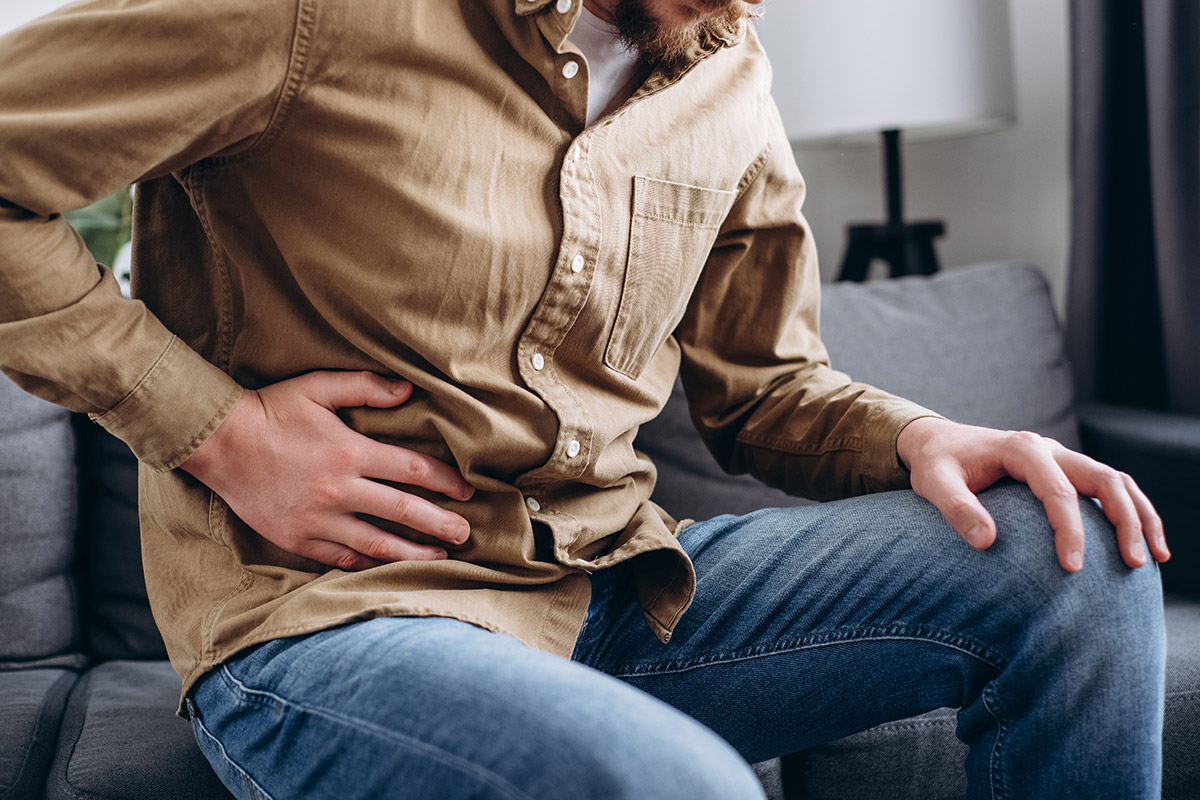Ask Dr Adam: Why Am I Bloated All the Time?

Up there with slow internet and traffic jams, there are few things in life as frustrating as looking forward to a delicious meal, only to feel weighed down by the discomfort of bloating afterward.
According to statistics, around 10 to 25% of healthy people experience frequent and uncomfortable bouts of bloating, which can range from mild discomfort to agonising pain that stops you in your tracks.
While bloating is a totally normal part of life, it can make going about your day-to-day activities more difficult – especially when all you want to do is lie down on the sofa in your loose track pants.
Thankfully, there are steps you can take to make life easier. We’ve turned to Form’s resident health expert, Dr Adam, for some insight.
What causes bloating?
“Bloating is essentially a feeling of fullness or swelling in the abdomen, which happens when gas or air accumulates in the gastrointestinal tract. It’s this production of gas that causes the tell-tale sensation of ballooning in the abdomen.
“Diet is often linked to bloating, but pinpointing the exact root cause can be tricky, as there’s not one singular, well-defined trigger that causes it. This ambiguity is why bloating is typically classified as a syndrome rather than a specific disease.
“In a lot of cases, treatment relies on anecdotal evidence and patients being diligent about keeping a food diary, since what works for one person might not work for another, and everyone’s triggers are different.
“What we do know is that digestion-related conditions such as irritable bowel syndrome (IBS), lactose intolerance, celiac disease or gastroesophageal reflux disease (GERD) can cause bloating as a symptom. Some people believe that their bloating is caused by intolerances to certain foods, which might trigger an inflammatory reaction around your gut lining, particularly in the hour or two after eating. Others might experience more of a nervous response, linked to stress, where they experience bloating without eating anything.
“This theory makes sense when you consider that there is a whole neuronal network surrounding your gut area, which is linked to the brain via the well-researched gut-brain axis.
“Added to this, changes in your gut microbiome could also play a role in triggering this response, although research on this is fairly inconclusive. As the microbiome can fluctuate based on the type of diet that you eat, it’s challenging to determine if a person’s microbiome is different to the norm because of bloating, or if it’s because they’ve adapted their diet to avoid specific trigger foods.
“Additionally, small intestinal bacterial overgrowth (SIBO) can cause bloating by leading to excess fermentation of food in the gut. And of course, many women can attest to the fact that fluctuations in hormones, particularly during menstruation or pregnancy, can lead to temporary periods of water retention and bloating.”

What can I do to feel better?
“The good news is that in most cases, bloating is just temporary and can be relieved by making simple dietary and lifestyle changes.
“One of the key things that has shown some promise in addressing bloating is eating more prebiotic and probiotic foods,which are loaded with beneficial bacteria that can help improve gut health and digestion. Supermarket foods rich in this gut-loving goodness include yogurt, kefir, sauerkraut and kimchi.
“If you experience bloating after eating, keep track of what you eat and how it affects your body with a simple food diary. This way, you can identify and avoid foods that tend to trigger bloating, such as high-fat foods, fizzy drinks, alcohol and foods high in fibre that your body may have difficulty digesting.
“The FODMAP diet is a temporary dietary approach that can be helpful for figuring out exactly what’s causing your discomfort, particularly if you have IBS or SIBO. FODMAPs are fermentable carbohydrates that can resist digestion, leading to fermentation by gut bacteria and the production of gas. Common culprits include onions, garlic and tomatoes.
“By eliminating these foods and then slowly reintroducing them into the diet, one by one, you can work out which ingredients are setting off your symptoms and tailor your diet accordingly. It’s important to note though that any major changes to your diet should be under guidance of your GP or registered dietitian, and low-FODMAP isn’t exactly a permanent solution, as you may be cutting out a lot of much-needed fibre from your diet.
“Unfortunately, there aren’t any specific ‘miracle’ superfoods that will ease your bloating. Personally, I think it’s more about assessing the overall quality of your diet and if you can make healthy changes. For instance, if you’re eating lots of highly-processed meats, breads, cereals, dairy and sweet foods, your body is going to have a harder time digesting these foods.
“And while dietary changes may go a long way in alleviating symptoms, it’s also essential to address other lifestyle factors like stress and sleep quality, as they could be exacerbating your bloating issues. This is particularly important for people who live busy lifestyles and experience bloating outside of mealtimes.

“Trying to make time to slow down and relax, through mindful activities like yoga, meditation and journaling, can have a positive effect on our digestion. Plus, make sure to drink lots of water, as hydration is crucial for maintaining gut health and naturally reducing constipation too.
“Finally, don’t overlook the importance of regular movement. Whether it’s running on a treadmill or just going for a daily walk in the park, physical activity can help stimulate digestion and alleviate bloating. As a general rule of thumb, we should all be aiming for the NHS recommended 150 minutes of exercises per week.
“If bloating persists despite these tweaks to your diet and lifestyle, or if it is accompanied by other symptoms such as severe abdominal pain, diarrhea or unintended weight loss, it’s advisable to speak to your doctor as it could be a sign of an underlying health issue. They can assess your symptoms and suggest any further treatment if necessary.”


















